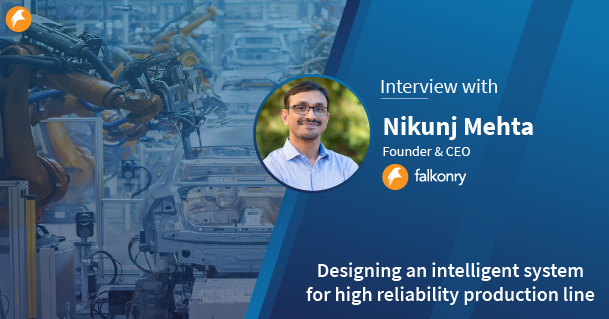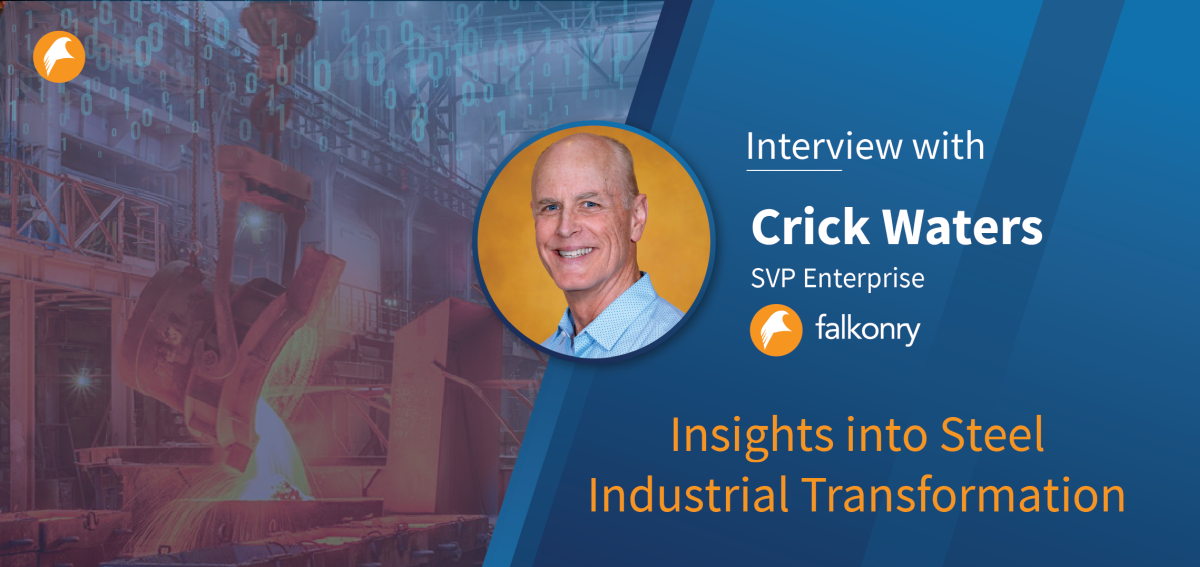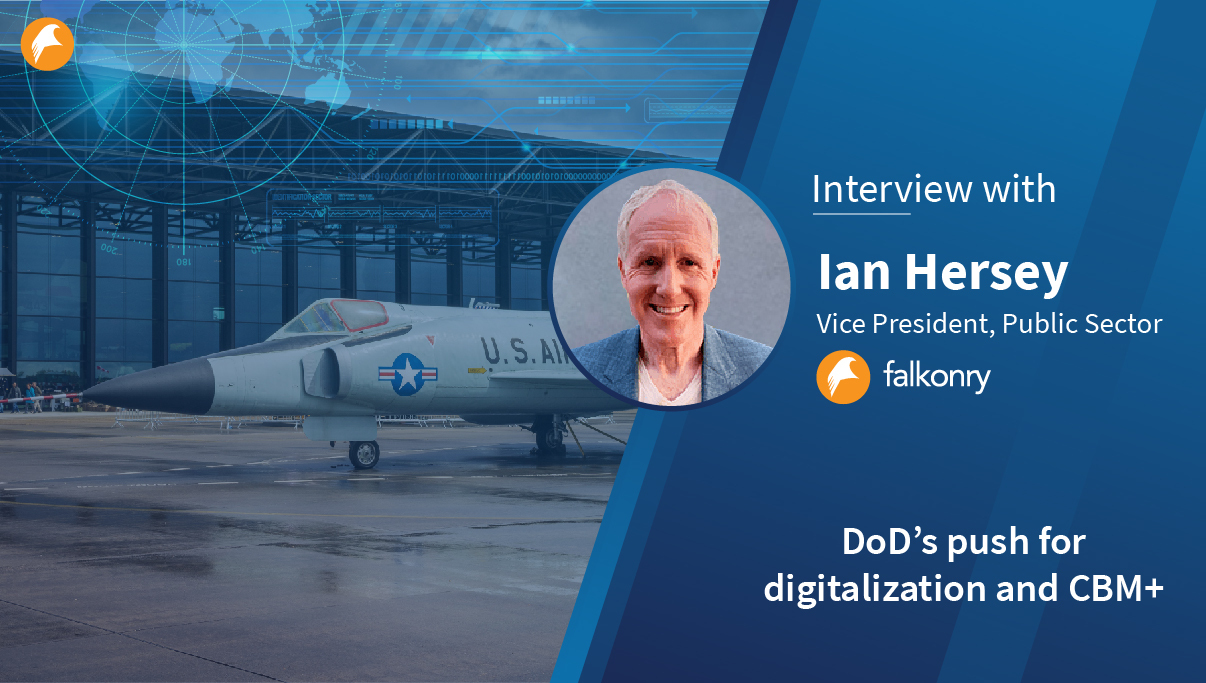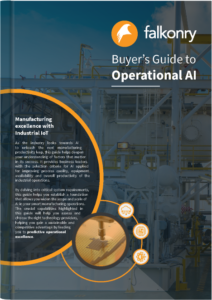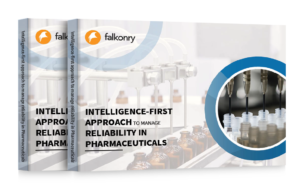Interview with Falkonry Founder and CEO, Dr. Nikunj Mehta
Key takeaways:
- Companies are seeking to improve their operations by optimizing data analysis and decision-making with AI technologies.
- AI has tremendous potential virtually any industry, particularly in instances where limits of human knowledge create surprises, e.g. in fraud, security, quality, and wellness.
- Falkonry is on a warpath to not only revolutionize smart manufacturing at scale but also to bring its AI-driven analysis platform to the world of cybersecurity.
To discuss cybersecurity, AI adoption, data analysis and Falkonry’s future roadmap, Founder and CEO, Dr. Nikunj Mehta had an insightful interview with Cybernews, reproduced below.

Q: Can you introduce us to what you do? How is AI incorporated into your products?
Nikunj: In a nutshell, we’re helping industrial companies and national security organizations improve their decision-making by identifying events of interest from their time series data. Machines and sensors today produce large volumes of data that provide clues about their state or their environment. When these measurements were recorded by hand, it was possible to interpret that data manually or with analytics tools. As companies seek to improve operations, they are producing way too much data for conventional methods. Falkonry has invented an AI to discover patterns in this data and identify events enabling teams to better understand operations and take timely actions to improve them. We used univariate and multivariate self-supervised deep learning as well as semi-supervised machine learning methods to identify and explain events that eliminate or at least significantly reduce the human effort to do so.
Q: Let’s go back to the very beginning of Falkonry. Can you tell us more about your journey?
Nikunj: I started looking at how AI can benefit manufacturing and heavy industry about 12 years ago when I was working at C3.ai. I soon realized that the need for bespoke analytics in industrial operations was a huge limiting factor for data-driven decision-making. Especially considering the variety of problems that arise in the real world. There simply aren’t enough people available to solve such problems in a bespoke manner, and the complexity is just too high to eliminate the need for people in decision making.
The hardest problem to be solved at first was a general learning method that could hand off findings to operational experts, so they could make decisions and act upon findings. For this to happen, both analytical advances such as semi-supervised learning on time series data and user experience for time series analytics were necessary. And Falkonry has nearly a dozen patents in these two areas.
Having grown up under the mantle of Larry Ellison and Tom Siebel, I wanted to bring Silicon Valley-style infrastructure, software architecture, and enterprise software economics to this space. Given the long tail of needs, this was going to be our unique advantage in what was likely to be a crowded space for enterprise offerings in this domain. With this background, I founded Falkonry at the tail end of 2012.
Much of the problem space is still the same. But now, technology that is well suited to these needs exists and has been validated both technically and economically.
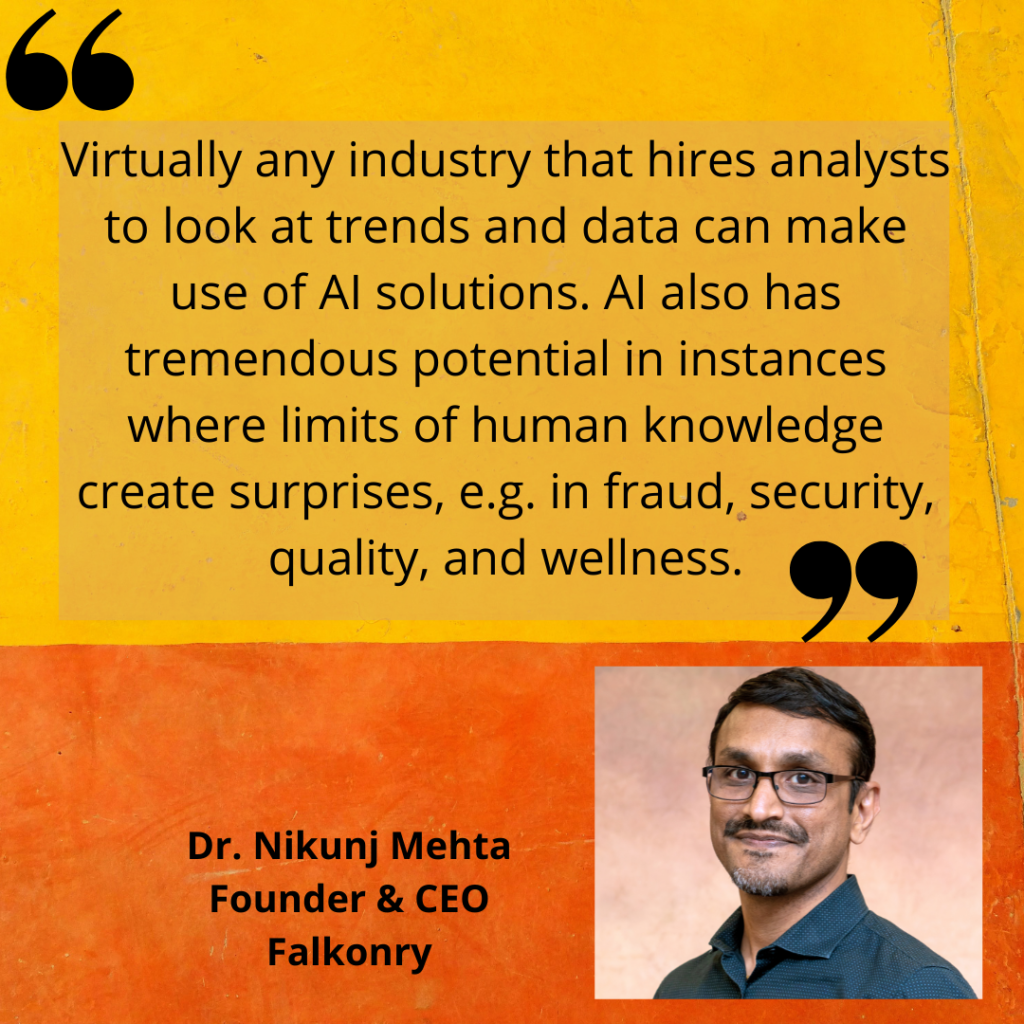
Q: In your opinion, which industries could greatly benefit from implementing AI solutions? Where can we expect to see AI-powered solutions used more often in the near future?
Virtually any industry that hires analysts to look at trends and data can make use of AI solutions. As the data volumes go beyond what human capabilities can handle, these industries are going to need to implement AI to enable their people to do their work more efficiently. This is already happening in many sectors. Take banking and finance, for example. Money laundering used to be analyzed by people, and credit fraud involved human verification of charges. But now, those fraudulent patterns in data are being brought to our attention by AI. Even in information security – intrusion detection, advanced heuristics engines are all taking advantage of AI and will continue to do so in the future.
AI also has tremendous potential in instances where limits of human knowledge create surprises, e.g. in fraud, security, quality, and wellness. Usually, there is sufficient data to anticipate surprises, but surfacing them is difficult. Such problems have a huge patient impact and can be neutralized with proactive data analysis. In general, workflow systems will be supplemented with AI – for example, in the areas of customer service, maintenance, loss management, physical care, and compliance. So that root causes are understood by the time a wave of issues gets reported.
The sequence in which industries will benefit is governed by the degree of investment made in instrumentation and the value addition afforded by increasing human efficiency. By that token, financials, industrials, defense, IT, infrastructure, and healthcare appear to be the main sectors that will benefit from AI the most.
Q: How did the recent global events affect your field of work?
Recent global events have annulled the conventional wisdom of globalization and highlighted the need for national policies in the sphere of physical activity such as manufacturing, labor, and natural resources.
This has urged the need to make maximum progress on increasing human efficiency. Especially in hard-to-fulfill jobs such as analysis that leads to increased operational efficiency. Fulfillment delays and rising shipping costs and tariffs make it necessary to increase manufacturing in higher cost and lower labor environments. That also forces greater reliance on digital methods. Finally, defense modernization relies heavily on improving our ability to exploit data more efficiently.
As our data generation capacity far exceeds our ability to analyze the data, it is creating strong tailwinds for the growth of Falkonry’s adoption by operational teams and deployment into field systems at scale to aid data-driven decision-making.
Q: What are the main problems that companies run into on their digital transformation journey?
Nikunj: Working with numerous customers over the years, we’ve identified several pain points or hurdles companies run into on their digital transformation journey. These challenges include:
- Lack of data governance leads to messy data sources
- Alignment of teams on how data improves decision making
- Confusion between AI as decision-maker vs. AI as decision enabler
You can read more about how we solve these challenges in our blog post here.
Q: Why do you think certain organizations are unaware of the security risks they are exposed to?
Security losses don’t manifest until malevolent actors exploit risks that have always been present. As more organizations seek newer ways to make and execute decisions, their risk surface area is increasing and moving from the physical to the virtual domain. While there is inherent worry about these risks, organizations are under tremendous pressure to proceed despite risks.
Also, security risks cannot be eliminated but only managed. Due to the unknown unknowns inherent in this domain, there is a need for more intelligent and full-spectrum approaches that go well beyond rules based on human knowledge and a sharing of that knowledge. Not just headers but even payload and their effects need to be assessed for their impact on security. Such approaches have been harder to imagine in the past but are now within reach. Patterns of unknown unknowns can be discovered easily and automatically in diverse data sources. Which will take us to another level of preparedness within this decade.
Q: Talking about cybersecurity, what would you consider the key best practices every company should follow?
Nikunj: As more and more enterprises are embracing digital transformation and investing heavily in IT infrastructure, cybersecurity has indeed become one of the most important challenges for organizations across the world. Some of the key best practices I would recommend are:
- Inculcate a cybersecurity-oriented culture across the organization. Make everyone aware of the Dos and Don’ts.
- Monitor your cyberinfrastructure at all times – 24x7x365. Automate this as much as possible so that the telemetry of network signals could be monitored efficiently.
- Implement techniques for User and Event Behavior Analytics (UEBA). Identify a variety of threat vectors by modeling the behavior of users and entities to detect and respond to insider threats that might be otherwise overlooked.
- Establish a team to handle ‘non-normal’ issues identified by constant monitoring for cybersecurity so that prompt actions could be taken. By using sophisticated AI/ML tools, the team also gets integrated as SMEs.
Q: Would you like to share what’s next for Falkonry?
Falkonry is on a warpath to not only revolutionize smart manufacturing at scale but also to bring its AI-driven analysis platform to the world of cybersecurity. The U.S DoD and Intelligence Community have already acknowledged the fundamental importance of time series AI and validated the design of Falkonry software. This is evident from its continued association with a variety of customer groups and use cases within that sector. Falkonry is leapfrogging into advanced network analysis, geospatial analysis, and complex system-of-systems analysis that involves thousands of high-speed sensor signals. We are very confident that these technological breakthroughs will be extremely beneficial to discovering cyber threat patterns on a large scale. We have also been selected for NVIDIA’s AI Accelerator program and are partnering with NVIDIA to springboard our AI analytics to petascale – resulting in never-seen-before speed and deployability of our solutions.

